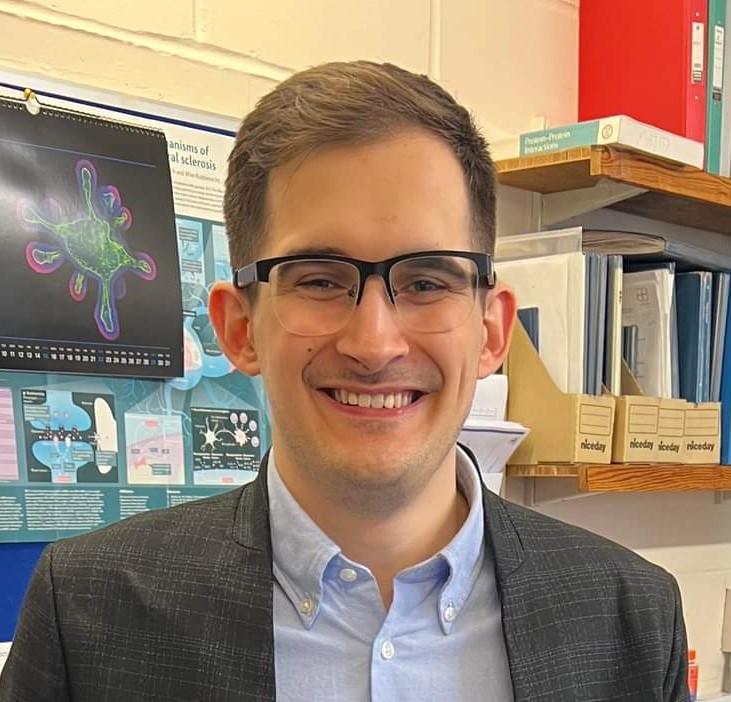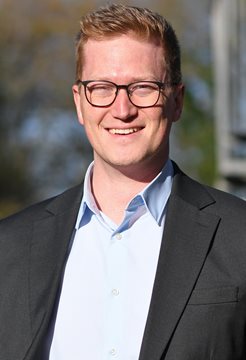
Alex Stuart-Kelly is an Education and Scholarship (E&S) lecturer in the department of Neuroscience at Sussex (since 2022). Prior to this, his PhD and short post-doctoral research focussed on understanding the role of the major Alzheimer’s risk gene variant APOE4 on hippocampal function and rapid ‘everyday’ place memory. Additionally Alex has worked on understanding how APOE4 influences the network state and properties of neuronal ensembles following naturalistic behaviours.
Alex’s teaching focus is on core neuroscience on the undergraduate and postgraduate programme, alongside human physiology, and neuroscience research techniques. His scholarship interests include supporting widening participation and outreach for HE science programmes and student engagement in large group teaching settings.

Oliver Steele completed his BSc (Hons.) in Medical Sciences with PTY at the University of Exeter Medical School, before simultaneously undertaking an MPhil in Biomedicine and Research Associate position at Cardiff School of Biosciences during which his research interests in neurodegeneration and applied electrophysiological techniques were developed. Oliver then moved to Sussex to undertake his PhD in Neuroscience under the supervision of Dr Andrew Penn and Dr Ruth Murrell Lagnado, functionally assessing the electrophysiological impact of APOE isoforms in the murine hippocampus. Oliver has since joined BSMS as a lecturer in Physiology teaching across Phase 1 of the BM BS Course. Oliver is a Member of the British Neuroscience Association and a Member of the Physiological Society.
Oliver is a Member of the British Neuroscience Association, Society Representative for the Physiological Society and Fellow of the Higher Education Academy.
The project team also includes Dr Elaney Youseff, Dr Nicola Schmidt Renfree and Shalini Ram.
What we did
Through this project we have sought to understand what makes large group teaching more engaging and effective for students studying Life Sciences and Medicine. We collaborated on a student-led initiative, leveraging both quantitative and qualitative approaches. The goal was to identify teaching methods that genuinely resonate with students and enhance their learning experiences. For this we are using a variety of tools, including surveys, focus groups, and teaching evaluations, to gather insights from students about what works best in large group settings.
The project will include participation from a fourth-year medical student as part of their Individual Research Project (IRP). This project is a significant component of their penultimate year of study, where they undertake a research project that is roughly equivalent to a dissertation in other undergraduate courses. This student will be taking the lead on the research, collecting and analysing both quantitative and qualitative data, and contributing to the overall goals of the project.
Why we did it
The motivation behind this project stemmed from both existing pedagogical literature and student feedback indicating that students were more engaged and performed better when specific active teaching methods were employed. However, these methods were not universally applied across all teaching sessions. We wanted to explore this further, to not only confirm the effectiveness of these methods but also to provide evidence that could encourage furthering best practice among science educators. This project was born out of a desire to make large group teaching more effective and enjoyable, responding directly to student needs and improving overall educational outcomes. Moreover, active co-creation with students is a central to both gaining informative feedback on teaching and providing opportunities for students to build valuable project leadership skills.
How it works
We began by collecting preliminary data from Life Sciences students through surveys that measured different aspects of student engagement. This included their study habits, participation in class, and their responses to various active teaching techniques. Surprisingly, we found that while students reported that active techniques such as break out discussions, problem solving, and example primary data improved their engagement, they rated their own participation behaviours lower compared to other engagement metrics. This suggested a need for more consistent integration of interactive and structured approaches in large group settings, but also more opportunities to promote student confidence in active learning.
We also analysed student feedback on what they valued most in lectures. Predictably, students favoured lectures with a clear structure, embedded interactive elements, and those with elements that mimicked exam formats, supporting their preparation.
Future developments
Looking ahead, the project will continue with a more in-depth analysis of student engagement and learning outcomes. This will include a detailed examination of course analytics and more focused qualitative research through student-led focus groups, further dissecting the themes emerging from initial survey data. The ultimate goal is to use these findings to inform curriculum development and teaching practices across the Life Sciences and Medicine disciplines. We also plan to disseminate our findings through various channels, including conferences, internal review processes, and eventually, a co-authored publication with the student who will be leading the next phase of this research.
Top tips
- Ask the students
Don’t shy away from directly asking students what works for them. Their feedback is invaluable in shaping effective teaching methods.
- Encourage student leadership
Providing students with leadership opportunities in research and curriculum development can lead to more engaged learning and valuable insights.
- Make it multi-disciplinary
Make good use of opportunities for collaboration. Initiatives don’t just have to be departmental, they can be institutional and cross-institutional.


[…] Enhancing student engagement in large group teaching: A collaborative approach to improving learning… […]